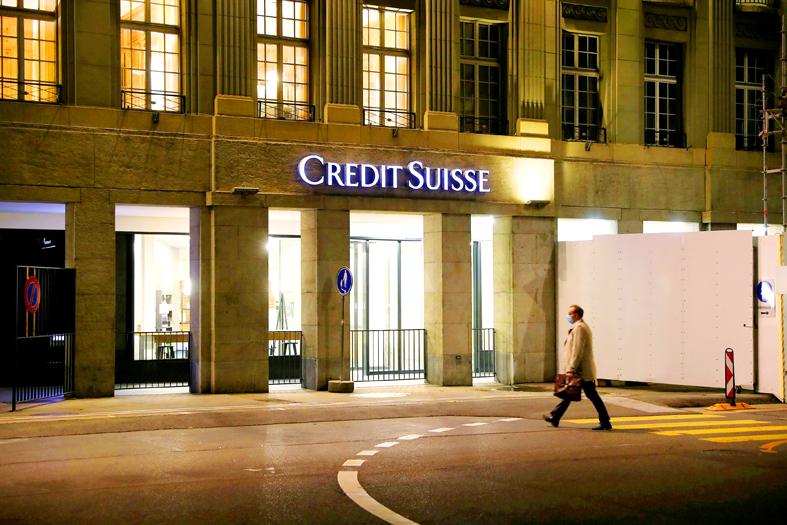Credit Suisse Group AG yesterday said that it had taken a US$4.7 billion hit from its links to troubled hedge fund Archegos Capital Management LLC, cut dividends and announced the departure of two senior executives.
The Swiss bank and Japan’s Nomura Holdings Inc last month warned that they could face significant losses due to their exposure to a US hedge fund forced to liquidate its holdings.
“The significant loss in our Prime Services business relating to the failure of a US-based hedge fund is unacceptable,” Credit Suisse chief executive officer Thomas Gottstein said in a statement.

Photo: Reuters
Bloomberg News has reported that the fund was little-known Archegos Capital Management, which sold more than US$20 billion in stocks from US media and Chinese companies as it sought to cover its obligations to its lenders.
Credit Suisse said that its pretax loss of 900 million Swiss francs (US$960 million) in the first three months of the year included SF4.4 billion related to “the failure by a US-based hedge fund to meet its margin commitments as we announced on March 29.”
Trading on margin is the practice of using borrowed funds to invest in financial assets such as stocks. It can be profitable for borrowers, as they are often only required to put down a small percentage in cash while the stocks serve as collateral for the lender.
However, large shifts in share prices can force borrowers to put up more money, that is to meet their margin commitments, or sell the shares and potentially lose more than their investment.
Credit Suisse also announced the departure of the head of its investment bank, and chief risk and compliance officer, while it pulled bonuses for senior executives and chopped its dividend.
The bank’s board of directors announced an investigation into the matter.
Credit Suisse also announced a separate probe into its supply chain finance funds, a reference to its exposure to the collapse of British finance firm Greensill Capital Ltd, which specialized in providing short-term financing to companies.
“The Archegos fallout ... has become a significant nightmare for Credit Suisse, and the bank has to take the right steps for its survival, as losses are just too big to digest,” AvaTrade analyst Naeem Aslam said.

South Korea’s equity benchmark yesterday crossed a new milestone just a month after surpassing the once-unthinkable 5,000 mark as surging global memory demand powers the country’s biggest chipmakers. The KOSPI advanced as much as 2.6 percent to a record 6,123, with Samsung Electronics Co and SK Hynix Inc each gaining more than 2 percent. With the benchmark now up 45 percent this year, South Korea’s stock market capitalization has also moved past France’s, following last month’s overtaking of Germany’s. Long overlooked by foreign funds, despite being undervalued, South Korean stocks have now emerged as clear winners in the global market. The so-called “artificial intelligence

Chinese artificial intelligence (AI) start-up DeepSeek’s (深度求索) latest AI model, set to be released as soon as next week, was trained on Nvidia Corp’s most advanced AI chip, the Blackwell, a senior official of US President Donald Trump’s administration said on Monday, in what could represent a violation of US export controls. The US believes DeepSeek will remove the technical indicators that might reveal its use of American AI chips, the official said, adding that the Blackwells are likely clustered at its data center in Inner Mongolia, an autonomous region of China. The person declined to say how the US government received

‘SEISMIC SHIFT’: The researcher forecast there would be about 1.1 billion mobile shipments this year, down from 1.26 billion the prior year and erasing years of gains The global smartphone market is expected to contract 12.9 percent this year due to the unprecedented memorychip shortage, marking “a crisis like no other,” researcher International Data Corp (IDC) said. The new forecast, a dramatic revision down from earlier estimates, gives the latest accounting of the ongoing memory crunch that is affecting every corner of the electronics industry. The demand for advanced memory to power artificial intelligence (AI) tasks has drained global supply until well into next year and jeopardizes the business model of many smartphone makers. IDC forecast about 1.1 billion mobile shipments this year, down from 1.26 billion the prior

FORTUNES REVERSED: The new 15 percent levies left countries with a 10 percent tariff worse off and stripped away the advantage of those with a 15 percent rate In a swift reversal of fortunes, countries that had been hardest hit by US President Donald Trump’s tariffs have emerged as the biggest winners from the US Supreme Court’s decision to strike down his emergency levies. China, India and Brazil are among those now seeing lower tariff rates for shipments to the US after the court ruled Trump’s use of the International Emergency Economic Powers Act to impose duties was illegal. While Trump subsequently announced plans for a 15 percent global rate, Bloomberg Economics said that would mean an average effective tariff rate of about 12 percent — the lowest since